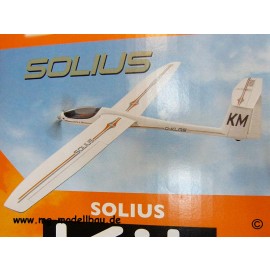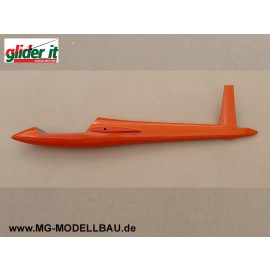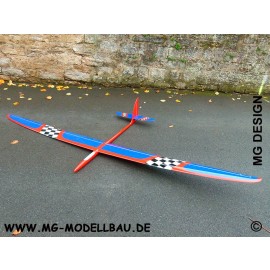KAVAN Mirai glider V-tail Kit
Artikelnummer: KAV02.8022
Artikelcode: 8596450020757
A two-meter thermal glider is one of the most rewarding machines in a recreational modeller's hangar. Nothing compares to peaceful relaxing flights in mild conditions, circling in the thermals under the clouds, quietly flying in the early evening peace when you can sit and watch your elegant model fly almost on its own
Nowadays, two-meter models with controlled rudder, elevator and airbrake and taking off with the help of rubber have their special competition category, where it's about flying together with similarly tuned modellers. And there's the F5-RES category for two-meter motorised gliders as well.
The "Two-meter" kits are also ideal for anyone who wants to build the models themselves, in a classic way of balsa, plywood and spruce beams. The build is nice and quick, and there's not much to it - MIRAI is still a pretty simple model in terms of construction, but it's not for complete beginners.
MIRAI model was designed and manufactured in the Czech Republic.
A kit of the high-performance thermal glider of a classic and very lightweight whole-balsa construction by parts, which you can also easily modify to be powered by a 150200W brushless motor. MIRAI is the ideal project for the modeller, who wants to build a really powerful model for competition or recreational flying. Thanks to the well thought out construction with CNC-cut parts fitted with tabs and notches that fit together like jigsaw puzzle pieces, the building is quick and easy. The MIRAI is a "competition thoroughbred " with which you can successfully compete for podium places in the F3-RES or F5-RES category. The kit includes fuselage parts for both a classic glider and an electric glider.
The forward part of the fuselage consists of a nacelle made of balsa and light plywood. Its core is a simple "box" structure with balsa sidewalls and plywood bulkheads. In the case of the glider, the elevator and rudder servos compartment is located in the fuselage under a removable side cover with a magnetic closure. In the case of the motorised glider, the servos are located under the wing. The tail section of the fuselage consists of a carbon tube beam with a glued-in pylon with a balsa-clad lightweight plywood core for mounting the horizontal tailplane. The gliders version also offers a carbon tube in the area under the wing, where you can easily place additional weights to increase penetration.
The three-part wing with a special HB RES profile is of a classic design with balsa ribs and a rigid-cover torsion box on the wing centre section. The main beam is made of spruce strips with balsa struts, which guarantees high strength of the skeleton at very low weight. The wing ends with elegant winglets are connected to the wing centre section by carbon couplers and beech pins with magnets as locks. The wing centre section houses a two-piece flip-up airbrake - we recommend not to skip this one, especially if you are building a "pure" glider. It is operated by a single servo via a carbon rod torsion actuator with fibreglass levers. The wing is attached to the fuselage by a plastic screw.
The tailplanes are are board, CNC-cut balsa parts glued together. They are removable for easy transport, fastened with a plastic bolt when slid onto the carbon guide rods. The flaps are controlled by wire cable rods.
You can cover the model with iron-on foil - e.g. transparent Oracover for purely recreational flying. If you are building a competition machine, lighter Oralite, Vlies or similar materials are preferred.
You will need at least a three-channel RC set to control the model (even just a two-channel set is sufficient for a pure glider without airbrakes). A common 915g micro servo with a thrust of 1.52 kg*cm will do.
For powering the electric version you will need a 150200W brushless motor with a diameter of 22mm, a 20A ESC, such as KAVAN R-20B, and a 2S or 3S LiPo 450mAh battery.
Already seen?
EUR 335,00
incl. 19% MwSt
EUR 310,00
incl. 19% MwSt
EUR 1.100,00
incl. 19% MwSt




